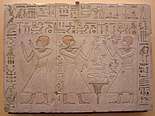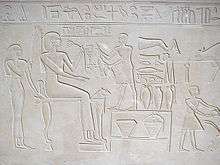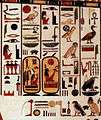Water-jugs-in-stand (hieroglyph)
The ancient Egyptian Water-jugs-in-stand hieroglyph, is Gardiner sign listed no. W17, W18, within the Gardiner signs for vessels of stone and earthenware.
| ||||||||
| Water jugs in stand in hieroglyphs |
|---|

Relief with 3- and 4-jug hieroglyphs.
| Wikimedia Commons has media related to Vases with support (hieroglyph). |
The hieroglyph is used as an ideogram in (kh)nt-(ḫnt), for 'a stand (for vases)'. It is also used phonetically for (ḫnt).[1]
Egyptian "khenti"
The water-jugs-in-stand hieroglyph is often written with the complement of three other hieroglyphs, the water ripple,
, bread bun,
, and two strokes,
, to make the Egyptian language word foremost, khenti. The complete composition block is:
As Egyptian "khenti",[2] foremost is used extensively to refer to gods, often in charge of a region, or position, as foremost of xxxx. Anubis, or Osiris are often referred to as "Foremost", or "Chief" of the 'western cemetery', (where the sun sets).

 Relief
Relief Painted Relief
Painted Relief
gollark: It is hotpluggable, but still.
gollark: osmarks.net may be down for some time. I accidentally unplugged the hard disk.
gollark: Just use Rust. It automatically preautohyperfixes all concurrency instantaneously.
gollark: I could offload this stuff to one of the osmarksVPSes™, which are generally more reliable, however no.
gollark: I made it not down.
See also
- Gardiner's Sign List#W. Vessels of Stone and Earthenware
- Smiting-blade symbol (hieroglyph)
References
- Betrò, 1995. Hieroglyphics: The Writings of Ancient Egypt, Water jugs in a stand, p. 216.
- Budge, 1978, (1920). An Egyptian Hieroglyphic Dictionary, 'khenti' , and other " 'Khenti'-Title-constructs", pp. 309-311.
- Betrò, 1995. Hieroglyphics: The Writings of Ancient Egypt, Maria Carmela Betrò, c. 1995, 1996-(English), Abbeville Press Publishers, New York, London, Paris (hardcover, ISBN 0-7892-0232-8)
- Budge. An Egyptian Hieroglyphic Dictionary, E. A. Wallis Budge, (Dover Publications), c 1978, (c 1920), Dover edition, 1978. (In two volumes) (softcover, ISBN 0-486-23615-3)
This article is issued from Wikipedia. The text is licensed under Creative Commons - Attribution - Sharealike. Additional terms may apply for the media files.